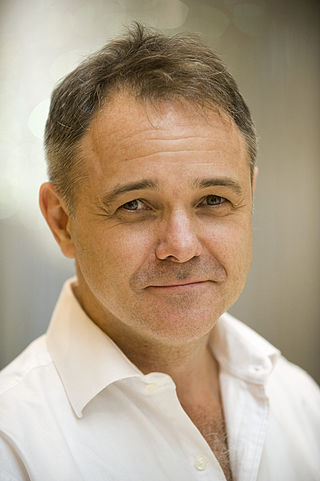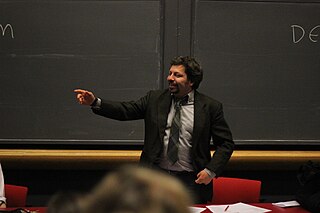
The Vaccine Research Center (VRC), is an intramural division of the National Institute of Allergy and Infectious Diseases (NIAID), part of the National Institutes of Health (NIH), US Department of Health and Human Services (HHS). The mission of the VRC is to discover and develop both vaccines and antibody-based products that target infectious diseases.
The Center for Infectious Disease Research and Policy (CIDRAP) is a center within the University of Minnesota that focuses on addressing public health preparedness and emerging infectious disease response. It was founded in 2001 by Dr. Michael Osterholm, in order to "prevent illness and death from infectious diseases through epidemiological research and rapid translation of scientific information into real-world practical applications and solutions". It is not part of the Center for Disease Control or National Institute of Health.

The Oxford Vaccine Group (OVG) is a vaccine research group within the Department of Paediatrics at the University of Oxford. It was founded in 1994 by Professor E. Richard Moxon, was initially based at the John Radcliffe Hospital, and moved in 2003 to its current location in the Centre for Clinical Vaccinology and Tropical Medicine (CCVTM) at the Churchill Hospital in Oxford, England. The group, led by Professor Andrew Pollard since 2001, comprises around 75 members across a number of disciplines, including consultants in paediatrics and vaccinology, clinical research fellows, research nurses, statisticians, post-doctoral laboratory scientists, research assistants and DPhil students.

Sir Jeremy James Farrar is a British medical researcher who has served as Chief Scientist at the World Health Organization since 2023. He was previously the director of The Wellcome Trust from 2013 to 2023 and a professor of tropical medicine at the University of Oxford.

The Coalition for Epidemic Preparedness Innovations (CEPI) is a foundation that takes donations from public, private, philanthropic, and civil society organisations, to finance independent research projects to develop vaccines against emerging infectious diseases (EID).

Roberto Burioni is an Italian virologist, physician, and academic. A Professor of Microbiology and Virology at the Vita-Salute San Raffaele University, he runs there a lab developing human monoclonal antibodies against human infectious agents, the study of pathogen-host interplay, and the use of molecular tools in the early diagnosis of infectious diseases. A prominent virologist, Burioni has risen to fame in Italy for his strong stance against the antivaccination movement and has been described as the "most famous virologist in Italy".

The COVID-19 pandemic, caused by severe acute respiratory syndrome coronavirus 2 (SARS-CoV-2), began with an outbreak of COVID-19 in Wuhan, China, in December 2019. It spread to other areas of Asia, and then worldwide in early 2020. The World Health Organization (WHO) declared the outbreak a public health emergency of international concern (PHEIC) on 30 January 2020, and assessed the outbreak as having become a pandemic on 11 March.

Neil Morris Ferguson is a British epidemiologist and professor of mathematical biology, who specialises in the patterns of spread of infectious disease in humans and animals. He is the director of the Jameel Institute, and of the MRC Centre for Global Infectious Disease Analysis, and head of the Department of Infectious Disease Epidemiology in the School of Public Health and Vice-Dean for Academic Development in the Faculty of Medicine, all at Imperial College London.
The COVID-19 pandemic in Italy is part of the ongoing pandemic of coronavirus disease 2019 caused by severe acute respiratory syndrome coronavirus 2.
The COVID-19 pandemic in San Marino was a part of the ongoing worldwide pandemic of coronavirus disease 2019 caused by severe acute respiratory syndrome coronavirus 2. The virus was confirmed to have reached San Marino in February 2020.
Marylyn Martina Addo is a German infectiologist who is a Professor and the German Center for Infection Research (DZIF) Head of Infectious Disease at the University Medical Center Hamburg-Eppendorf. Addo has developed and tested vaccinations that protect people from Ebola virus disease and the MERS coronavirus EMC/2012. She is currently developing a viral vector based COVID-19 vaccine.
Natalie E. Dean is an American biostatistician specializing in infectious disease epidemiology. Dean is currently an assistant professor of Biostatistics at the University of Florida. Her research involves epidemiological modeling of outbreaks, including Ebola, Zika and COVID-19.
Science diplomacy is the collaborative efforts by local and global entities to solve global issues using science and technology as a base. In science diplomacy, collaboration takes place to advance science but science can also be used to facilitate diplomatic relations. This allows even conflicting nations to come together through science to find solutions to global issues. Global organizations, researchers, public health officials, countries, government officials, and clinicians have previously worked together to create effective measures of infection control and subsequent treatment. They continue to do so through sharing of resources, research data, ideas, and by putting into effect laws and regulations that can further advance scientific research. Without the collaborative efforts of such entities, the world would not have the vaccines and treatments we now possess for diseases that were once considered deadly such as tuberculosis, tetanus, polio, influenza, etc. Historically, science diplomacy has proved successful in diseases such as SARS, Ebola, Zika and continues to be relevant during the COVID-19 pandemic today.

Nir Eyal is a bioethicist and Henry Rutgers Professor of Bioethics and Director of the Center for Population–Level Bioethics at Rutgers University in New Jersey. He was formerly a bioethicist in the Department of Global Health and Population of the Harvard T.H. Chan School of Public Health and the Department of Global Health and Social Medicine of the Harvard Medical School. He has long worked closely with Harvard bioethicist Daniel Wikler. Eyal's current visibility concerns his role in studying the ethics of human challenge trials in HIV, malaria, and coronavirus vaccine development. He has also written on 'bystander risks' during pandemics and infectious diseases and contract tracing during ebola.
Biotechnology industry in Italy is a highly innovative and fast-growing sector dedicated to research. At the end of 2019, there are 696 biotech companies active in Italy.
The Gamaleya Research Institute of Epidemiology and Microbiology, previously the N. F. Gamaleya Federal Research Center for Epidemiology & Microbiology, is a Russian medical-research institute within the Ministry of Health of the Russian Federation.

The COVID-19 vaccination campaign in Italy is a mass immunization campaign that was put in place by the Italian government in order to respond to the ongoing COVID-19 pandemic. It started on 27 December 2020, together with most countries in the European Union.

The following is a timeline of the COVID-19 pandemic in Italy.

GRAd-COV2 is a COVID-19 vaccine candidate developed by ReiThera Srl and Lazzaro Spallanzani National Institute for Infectious Diseases. It is based on a novel replication defective Gorilla Adenovirus and encodes for SARS-COV-2 full length prefusion stabilized Spike protein. More specifically, the vector used is the simian group C adenovirus GRAd32, isolated from a captive gorilla, with a genome deleted of the entire E1 and E3 regions and the native E4 region replaced with the E4 orf6 of human adenovirus 5 (hAd5).

John R. Mascola is an American physician-scientist, immunologist and infectious disease specialist. He was the director of the Vaccine Research Center (VRC), part of the National Institute of Allergy and Infectious Diseases (NIAID), National Institutes of Health (NIH). He also served as a principal advisor to Anthony Fauci, director of NIAID, on vaccines and biomedical research affairs. Mascola is the current Chief Scientific Officer for ModeX Therapeutics.











